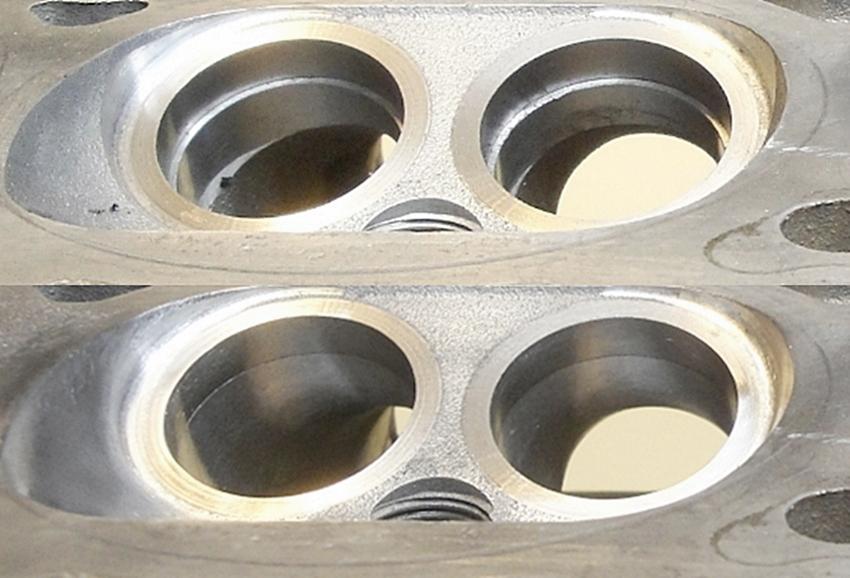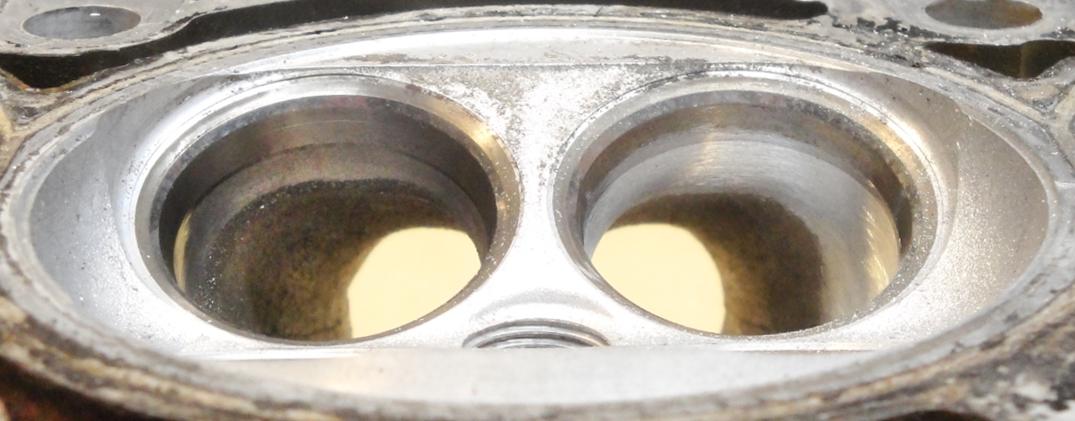same head - big valves can help with a multitude of casting, and machining flaws

Pre 1973 Toyota 2TC head gets +1mm valves... throats (bowl/seat) grow by over 1.5mm.

Deep inside the ports grow as well....

Not sure where to go from here... 2.5 duratec head. Numbers are currently:
1.) 42.0
2.) 41.9
3.) 41.8
4.) 41.9
These were my numbers after minor cleanup w/ carbide bit and 80 grit rolls, but cyl. 3 was at 41.6cc. I feel like I've taken out what I can from #3, like if I go any further, I'm gonna start changing the shape too much from the others. What should I do? I moved the #1 valves to #3, just to make sure that it wasnt bc of smaller valves. I have CC'd all 4 plenty of times to rule out error also.
Also, what grit should i finish the intake ports with? Aand also, if I CC the intake ports, what's an acceptable number to equalize them to? Thanks guys!


fullcircling said:Not sure where to go from here... 2.5 duratec head. Numbers are currently:
1.) 42.0
2.) 41.9
3.) 41.8
4.) 41.9
These were my numbers after minor cleanup w/ carbide bit and 80 grit rolls, but cyl. 3 was at 41.6cc. I feel like I've taken out what I can from #3, like if I go any further, I'm gonna start changing the shape too much from the others. What should I do? I moved the #1 valves to #3, just to make sure that it wasnt bc of smaller valves. I have CC'd all 4 plenty of times to rule out error also.
Also, what grit should i finish the intake ports with? Aand also, if I CC the intake ports, what's an acceptable number to equalize them to? Thanks guys!
If I may... stop.
As the valves on their seats is the biggest determinate of volume change - do this procedure after the valve job. Once the valves are on their final seat depths, then begin your measuring process.
Last.... do some compression ratio calculations using your different chamber volumes - I'll bet getting to within a tenth of a cc (maybe 2 tenths) should be close enough.....
As far as surface finish - On heads with injectors pointing at the valves, I typically finish a head with a medium flapwheel, followed by a coarse Dremel sanding buff (buff on right)

Ok, yea that makes more sense. Polishing valve surfaces first.. im worried my valve tool wont stick to the surface. Looks like I got one that's too small.. might have to DIY another one. There's still way more carbon on these than I initially thought.

Quick question, am I only worried about making contact with the wider, second cut on the valve seat? There's no "back cut" on the valves as far as I can tell.
How it sounds:
https://m.youtube.com/watch?v=txFMdaPzqRE


Also, do keep lapping with this stuff until the surface is polished? Or just until the faces are mated back into each other and are quiet? Thank you!

I'm not a fan of using valve compound to do what a valve job is designed for.
With that said - all you need is a consistent contact patch for the valve seat, you are not looking to polish anything.
Quick question about a flow bench setup.
When you set up an intake or head on a flow bench, does the flow bench push the airflow through the item being tested, or does the flow bench draw the airflow through the item being tested.
Or does it not make a difference...
Scott
Noddaz said:Quick question about a flow bench setup.
When you set up an intake or head on a flow bench, does the flow bench push the airflow through the item being tested, or does the flow bench draw the airflow through the item being tested.
Or does it not make a difference...
Scott
Both... when testing intake the bench sucks, and when testing exhaust.... yep it blows. You want to test the ports the same way they will function.
The bench has a long tube that acts as the cylinder. You center the combustion chamber over the cylinder and you test. The flow bench (in my case a single 5hp shop vac) can direct the air by simply hooking up the different outlets/inlets to the testing cylinder
Is this valve seat misalignment an issue for porting? All of the intake valves on this head are off center by about 1mm relative to the ports from Subaru. I was looking to play around with this head as a first porting project, but am not sure how I would correct this issue without cutting away at a significant chunk of the valve seat.
Is there a better way to solve this problem?

I'm seeing too often where the intake port is opened straight below the intake seat. Like people are trying to "open up" the intake port.
The trick to getting flow is not so much size as shape. Just below the intake seat there should be a radius to turn the air to follow the 45 degree intake seat.
Lacking that radius, air will be going along and then forced to start tumbling as it is suddenly changing directions.
Air enters the cylinder shaped by the valve seat and if it's not "redirected" to that 45 degree angle it's forced to change which induces turbulence. That turbulence slows air flow, the opposite of what you are trying to achieve.
The same applies to the exhaust port.
Just remember shape is more important than volume, when it comes to flow
wes7143 said:Is this valve seat misalignment an issue for porting? All of the intake valves on this head are off center by about 1mm relative to the ports from Subaru. I was looking to play around with this head as a first porting project, but am not sure how I would correct this issue without cutting away at a significant chunk of the valve seat.
Is there a better way to solve this problem?
Valve diameter? Inner diameter of valve seat?
Plan is to run a set of vintage TRD big valves..... first step... big valve seats, once porting is finished, the seats will get cut.

Porting to run big valves.....

oldeskewltoy said:Plan is to run a set of vintage TRD big valves..... first step... big valve seats, once porting is finished, the seats will get cut.
Porting to run big valves.....
The finished seats, bowls and chamber...

If the ports are straight like you have. The flow has to slow down to make the sharp turn past the valve seats. If you aide that turn by putting an hour glass shape just before the seats. Flow will improve dramatically.
It seems counterintuitive, leaving metal in the ports but think about it like the air is a race car approaching a corner. You want as big a radius as you can get so your speed ( and thus the flow volume ) increases.
frenchyd said:If the ports are straight like you have. The flow has to slow down to make the sharp turn past the valve seats. If you aide that turn by putting an hour glass shape just before the seats. Flow will improve dramatically.
It seems counterintuitive, leaving metal in the ports but think about it like the air is a race car approaching a corner. You want as big a radius as you can get so your speed ( and thus the flow volume ) increases.
Can you "show me" what you mean.... here is a Formula Atlantic 4AGE cut away view......

In reply to oldeskewltoy :
I'd love to but I don't know how to sketch.
Imagine the valve in place as it opens, on the short side radius the flow must take a sharp radius turn. Basically it's like a car comes to almost a complete stop and then turns the corner. If there is a gradual radius, like the leading edge of a wing it can flow much faster.
That turbulence that is created with the sharp turn slows the flow for almost the rest of the intake flow.
It's not as critical on the long side of the port but again, just as the valve is opening. That sharp turn slows the flow at the initial opening moment.
Almost all you have ( assuming a non boosted engine) is atmospheric pressure pushing air into the cylinder. The vacuum signal at that point is pretty weak. Since the piston is going down at a relatively slow speed at that point in the stroke.
Have I helped in any way? Or made it clear as mud?
frenchyd said:In reply to oldeskewltoy :
made it clear as mud?
pretty much.... Typically I'm removing sharp edges/turns in the short radius.... For example here are a couple of 2JZ ports, one intake.....

amd an exhaust....

Or do you mean something else entirely...???
speaking about 2JZ exhaust.... I guess boost cures all ails...... because there is plenty of room for improvement......

https://www.grassrootsmotorsports.com/forum/grm/intake-porting/241841/page1/#post3694980
Any way you can take a look and give some wisdom?
You'll need to log in to post.